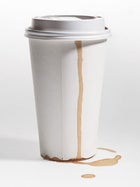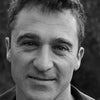Hypothesis: Quitting caffeine will lead to a less stressed, healthier life
FIT LIT
The Book:The Moneyless Man, by Mark Boyle (Oneworld Publications, .95)THE SELL: Boyle, who went a year without spending a dollar, pushes the idea that a moneyless life can improve mental and physical health by giving you a true sense of community.
BOYLE SAYS: “Living moneyless forces us to obtain the materials we need locally; it forces us to take responsibility for meeting our community’s needs; it forces us to have more appreciation for what we use.”
THE TAKEAWAY:
You spend too much cash. For a month, record everything you spend. Then turn a critical eye to your list. Divide what you needed to spend—on shelter and food—from what you merely wanted to spend. Try to cut out some …
Coffee
 “Pharmacologically, caffeine is a drug,” says a research fellow in the department of psychiatry at Johns Hopkins University. “People can become tolerant, and then they have to use it every day in order to maintain their normal mood level and cognition.”
“Pharmacologically, caffeine is a drug,” says a research fellow in the department of psychiatry at Johns Hopkins University. “People can become tolerant, and then they have to use it every day in order to maintain their normal mood level and cognition.”Time Commitment: 30 days
Researcher: Abe Streep
I see many reasons not to quit. The smell, for one. The steam rising off a cup of coffee offers an olfactory promise, the hope that this day may prove more rewarding than the last. While academics have warned for years about the dangers of excessive consumption—caffeine can lead to everything from insomnia and drowsiness to increased blood pressure—the good thing about the scientific community is that its collective opinion constantly changes.
In 2006, Gary Arendash, a University of South Florida professor and researcher at the Florida Alzheimer’s Disease Research Center, led a study showing that the consumption of four to six cups of coffee a day may help prevent Alzheimer’s and Parkinson’s. Arendash, who downs five cups a day, says that pregnant women, children, and those with an unusually high sensitivity to caffeine should limit their intake—but that “everyone else should be safe in that four-to-six-cup range.”
So why, starting tomorrow, will I cut my dosage for five days until I quit entirely? Because I’m up to three or four cups during deadlines. Because 4 P.M. feels increasingly foggy. Because some cry foul on Arendash’s findings. “Advising people to consume five cups of coffee daily would be bad advice,” says Jack James, professor of psychology at the National University of Ireland, in Galway, who believes that long-term coffee consumption can lead to increased risk of heart disease.
And because caffeine is addictive. “Pharmacologically, caffeine is a drug,” says Daniel Evatt, a research fellow in the department of psychiatry at Johns Hopkins University. “People can become tolerant, and then they have to use it every day in order to maintain their normal mood level and cognition.” In other words, it’s tough to quit when withdrawal symptoms range from splitting headaches to fumbling intellect. And not everyone deals with the world’s most popular drug well. A Kentucky man recently killed his wife and blamed his rage on excessive consumption of—you guessed it—caffeine.
DAY 1 [1/2 CUP DECAF, 1/2 CUP LEADED]: Last-minute reporting assignment, 6.5-hour drive from Santa Fe to Boulder; iPod malfunctioning; radio dominated by Christian rock; decaf inadequate. There is a bad God.
DAY 3 [1/2 CUP DECAF, 1/2 CUP LEADED]: Caffeine is a vasoconstrictor—it inhibits blood flow to the brain. Many experts think that withdrawal headaches are caused by dilating vessels sending more blood to your noggin. “The headaches usually last two or three days,” says Evatt, “but in some cases can last two weeks.” Someone is running knuckles along the inside of my skull.
DAY 5 [ONE 8-OZ CUP OF GREEN TEA, MY LAST CAFFEINE FOR A MONTH]: Experts maintain that green tea contains about half the caffeine of coffee. I maintain that green tea is to coffee what Bud Light is to Wild Turkey.
DAY 7 [ENTIRELY OFF CAFFEINE]: The headaches are gone, but I still feel tired by midafternoon. I’ve been taking online tests measuring my visual response time and decision making twice a day. In the mornings, I can successfully tell the blinking screen that a horse is, in fact, a horse about 95 percent of the time. This afternoon, when I take the decision-making test, I’m right only 85 percent of the time.
DAY 14: Unable to subdue the mildest of hangovers, I decide to take a week off booze.
DAY 17: Three-mile run and six wind sprints before work. The day flies. I decide that exercising before work, rather than after, will become my new standard operating procedure. I ace the cognitive-function test in both the morning and evening. Skeptics might point out that I’m simply becoming more proficient at the online quiz. I am the master of blinking lights!
DAY 21: The stress associated with juggling multiple assignments has relented. Deadlines are met with aplomb. Restraint empowers me. Peppermint tea tastes good.
DAY 31: The day of reckoning comes and goes. I do not order coffee. I do not desire it.
DAY 33: A friend’s farm in Vermont. Rain hammers the roof. I do not need the coffee that my friend brews on her old stove. But, life being short, I would like some. I sip, and the rush comes slowly, a sustained soft pulse in my frontal lobe. I open my laptop and take the online cognitive tests. I score my fastest visual-response time yet. “Generically, less is better,” says Evatt. “If you can stick to low levels of caffeine—an eight-ounce cup of coffee a day or less—you can still get positive effects and are less likely to become dependent.” I resolve to limit myself to one cup a day. I resolve not to drink it in the afternoons. I walk out in the rain and make my final resolution: Coffee, my love, I will never stray again.


